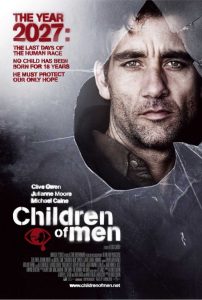Children of Men
Posted By Trevor Lynch On In North American New Right | Comments DisabledMexican director Alfonso Cuarón’s Children of Men (2006) is loosely based on P. D. James’ 1992 novel of the same name. Cuarón is solidly Leftist, but Children of Men seems more and more like a Right-wing vision of dystopia with each passing year. (Cuarón’s 2001 film Y Tu Mamá También, is basically Marxist propaganda and soft-core porn, but his 2013 hit Gravity could be seen as an argument against putting women in the military or space, although I don’t think this was the director’s intention.)
Children of Men is set in 2027. For unknown reasons (surely none of them related to feminism), the human race has become infertile. The youngest humans on the planet are 18 years old.
In the Introduction to The White Nationalist Manifesto [2], I have a thought experiment about what would happen if a particular people, or the whole human race, were to discover that they have no genetic future, i.e., that they are going extinct. (I had not seen the movie at the time I wrote it, but I remember reading about James’ novel in 1992, and the premise stuck with me.)
James and I both speculated that impending human extinction would lead to rises in anti-social, short-term, self-destructive behaviors and well as intense religiosity. James also predicts the rise of Left-wing terrorist violence, which makes sense, since Leftism is a form of religion for unbelievers.
In James’ scenario, the nihilism and fanaticism unleashed by impending extinction have left the planet devastated by wars, insurrections, plagues, and migrations. But sea-girt Britain has managed to maintain order with an authoritarian government. Because Britain is relatively stable, however, it is a target for massive waves of illegal immigrants and refugees from the rest of the world.
In Cuarón’s film, entire cities have been walled off as refugee camps ruled by violent gangs. The Fishes are a Left-wing pro-refugee terrorist sect, who, in the name of love and kindness, want to unleash the refugee tide so it can drown Britain like the rest of Europe.
I am not sure if 2006 audiences and critics saw Cuarón’s dystopian vision of Britian’s future as outlandish and unlikely. But today his depictions of ruined English cities swarming with non-whites, parades of Muslims chanting “Allahu Akbar” and firing guns in the air, and brutal urban firefights between terrorist gangsters and the British army seem more like current events than prophecy — especially after the migrant crisis began in 2014, applauded by Europe’s elites as a humanitarian duty but also urged as an economic necessity — because of low European fertility. After all, Mammon is our god, and if Europeans fail to keep the economy afloat, they must be replaced by non-Europeans. The economic system is absolute. The people are fungible.
The story that James and Cuarón set in this world is, frankly, less interesting than the world itself. I won’t spoil the plot except to say that it centers around the first glimmer of hope for humanity in 18 years, namely a woman has become pregnant. But she is a refugee, and unfortunately, her life and that of her child are imperiled because they have become pawns of the Fishes terrorist gang, who want to use them as symbols to spark an uprising. The hero, Theo Farin (Sin City‘s Clive Owen), another pawn drawn in by the Fishes, tries to spirit the pregnant woman away to safety.
Cuarón portrays British police and soldiers as Nazi-like sadists and martinets who seem to delight in senseless acts of violence. But the Fishes are also portrayed as a pack of treacherous, hysterical, homicidal freaks and degenerates.
From a White Nationalist point of view, the most repugnant aspect of the film is that the pregnant woman is a very black African. This is Cuarón’s invention, not James’. Thus we are treated to the spectacle of a white hero risking life and limb to save a black woman and her child who are the hope of the human race. At the end of the film, we are left wondering: Does this child perhaps mean that the curse of infertility can be lifted for the entire human race? Or will Africans alone inherit the planet? Frankly, the latter is hardly a happy ending, and the whole film would end up being just a disgusting exercise in glorifying white racial altruism. Normies are supposed to feel hope at the end, but racially-conscious whites will still feel despair.
Nevertheless, happy ending or not, Children of Men is still worth seeing. It is an intense and gripping action film set in an increasingly realistic dystopian future. It is brilliantly directed with an excellent script, striking images, solid performances (including Michael Caine as a lovable old stoner), and some well-chosen music. Its images of a race facing long-term extinction and fighting off non-white hordes are especially relevant to whites today, thus Children of Men might be a useful teaching tool to get white “normies” to start talking about the most pressing issues of our time. After all, 2027 is right around the corner.
